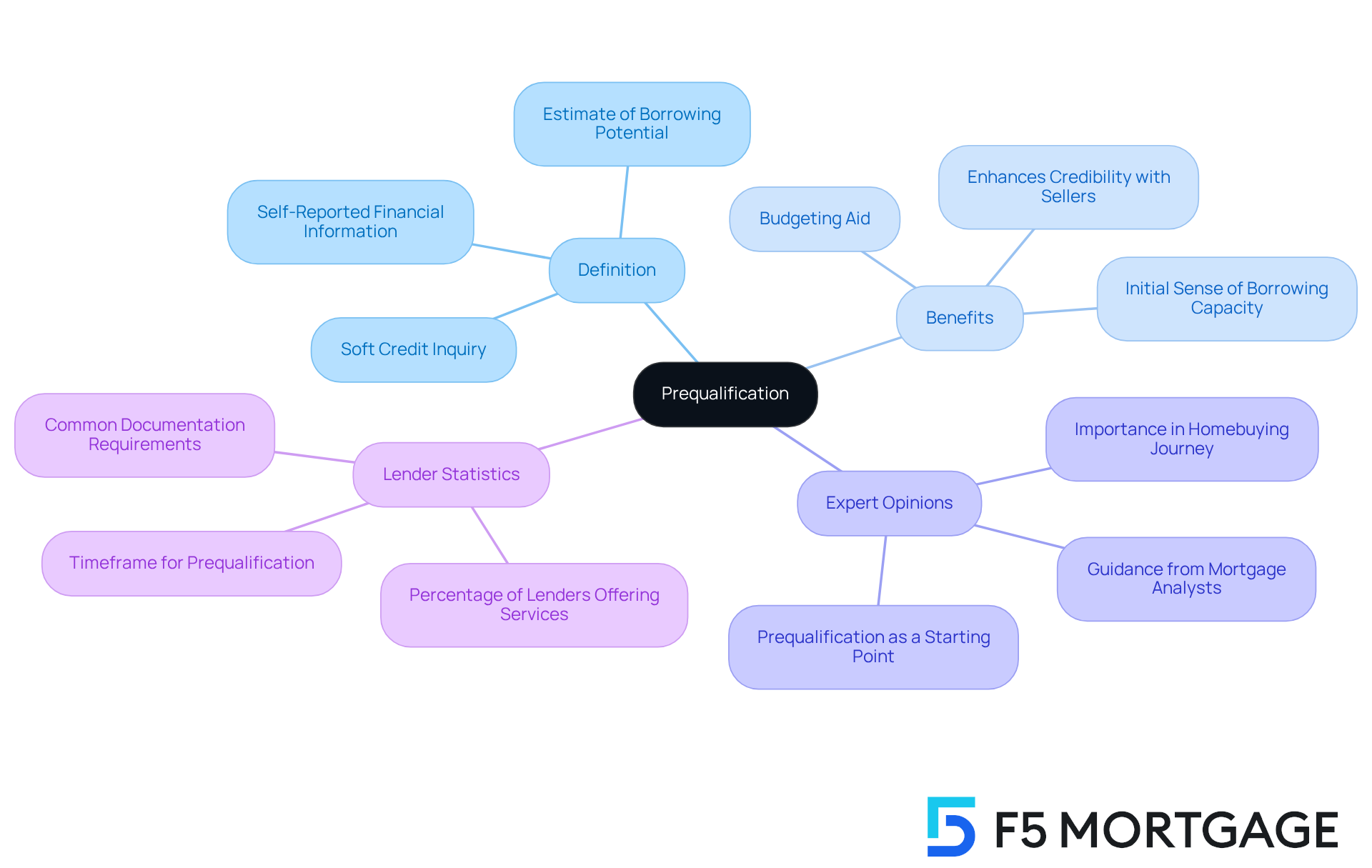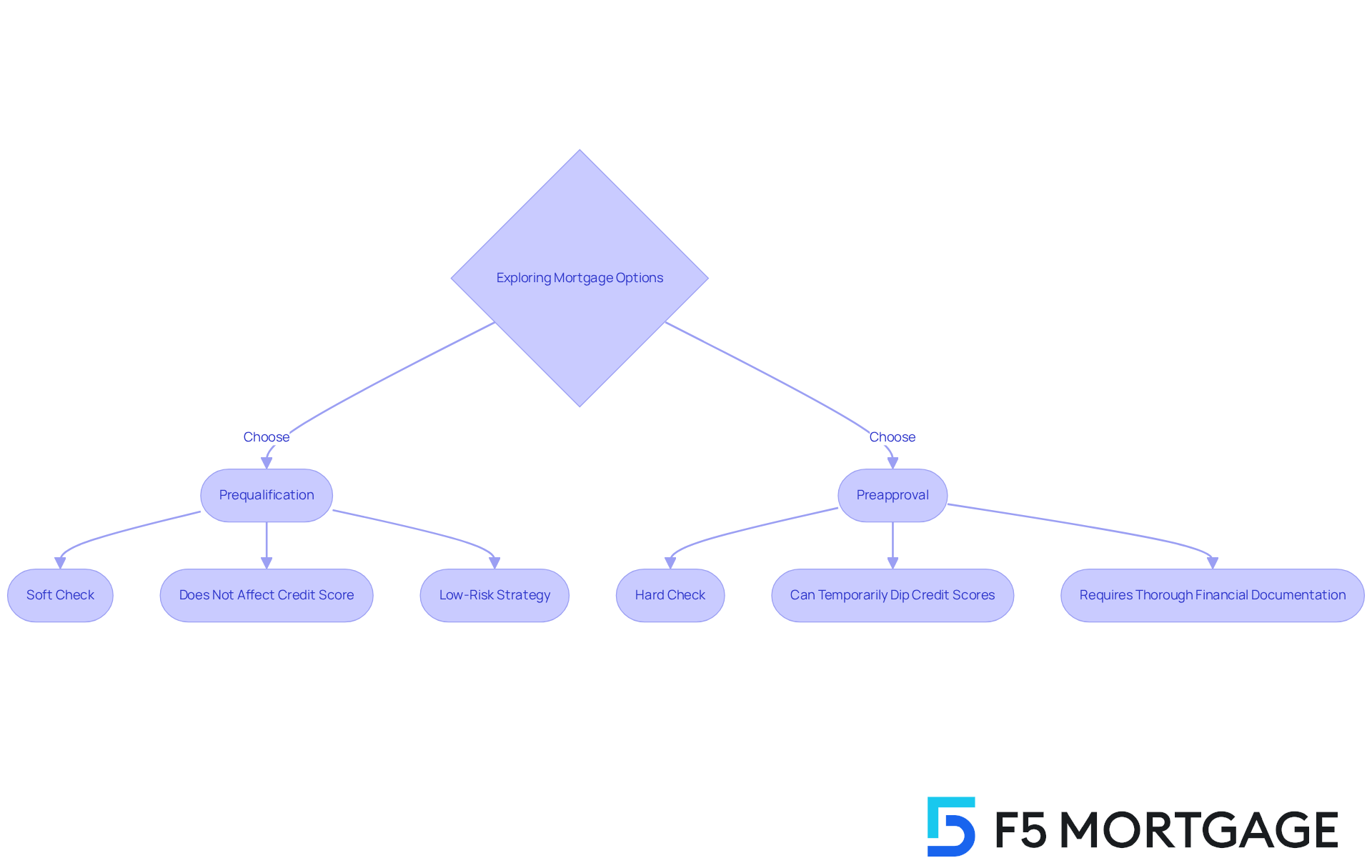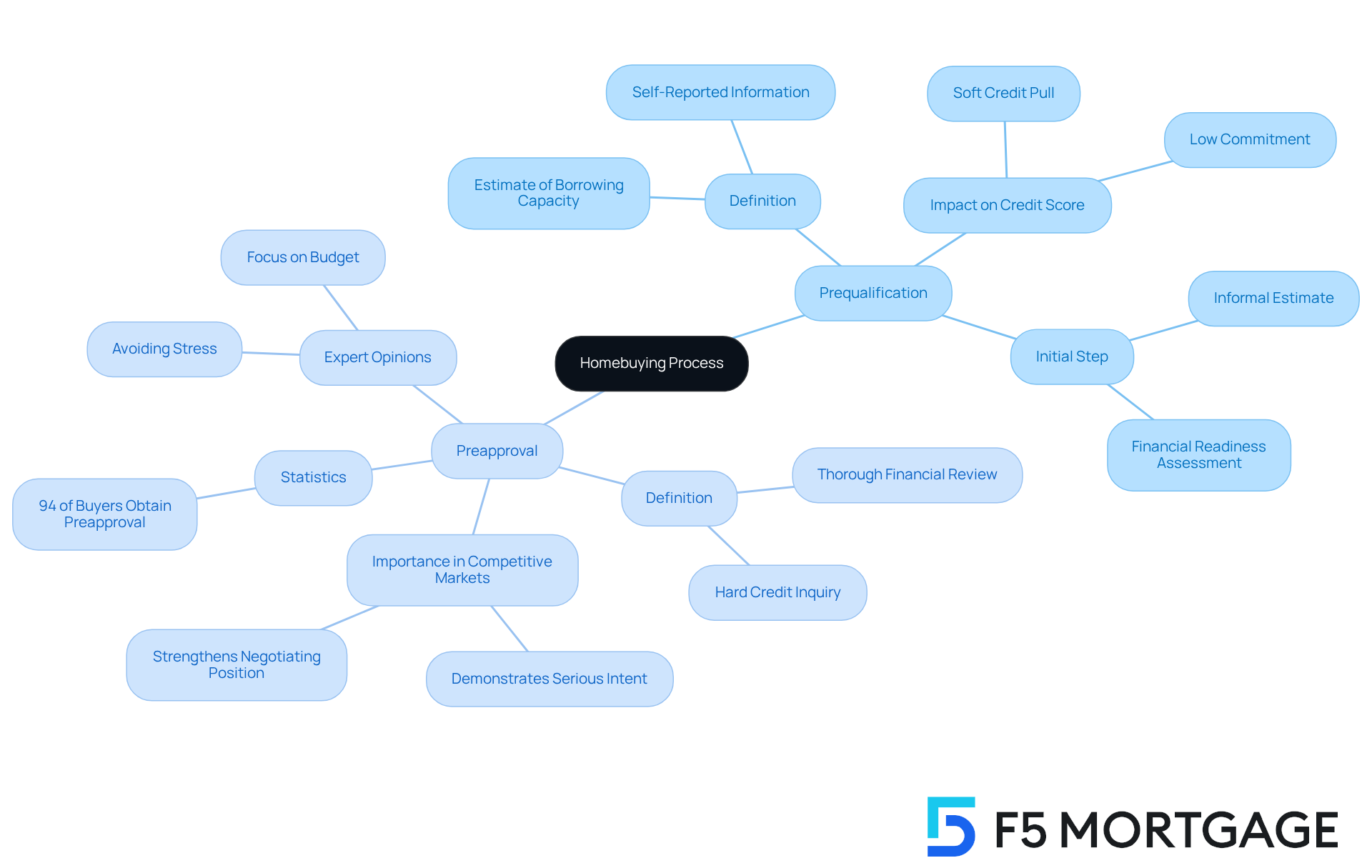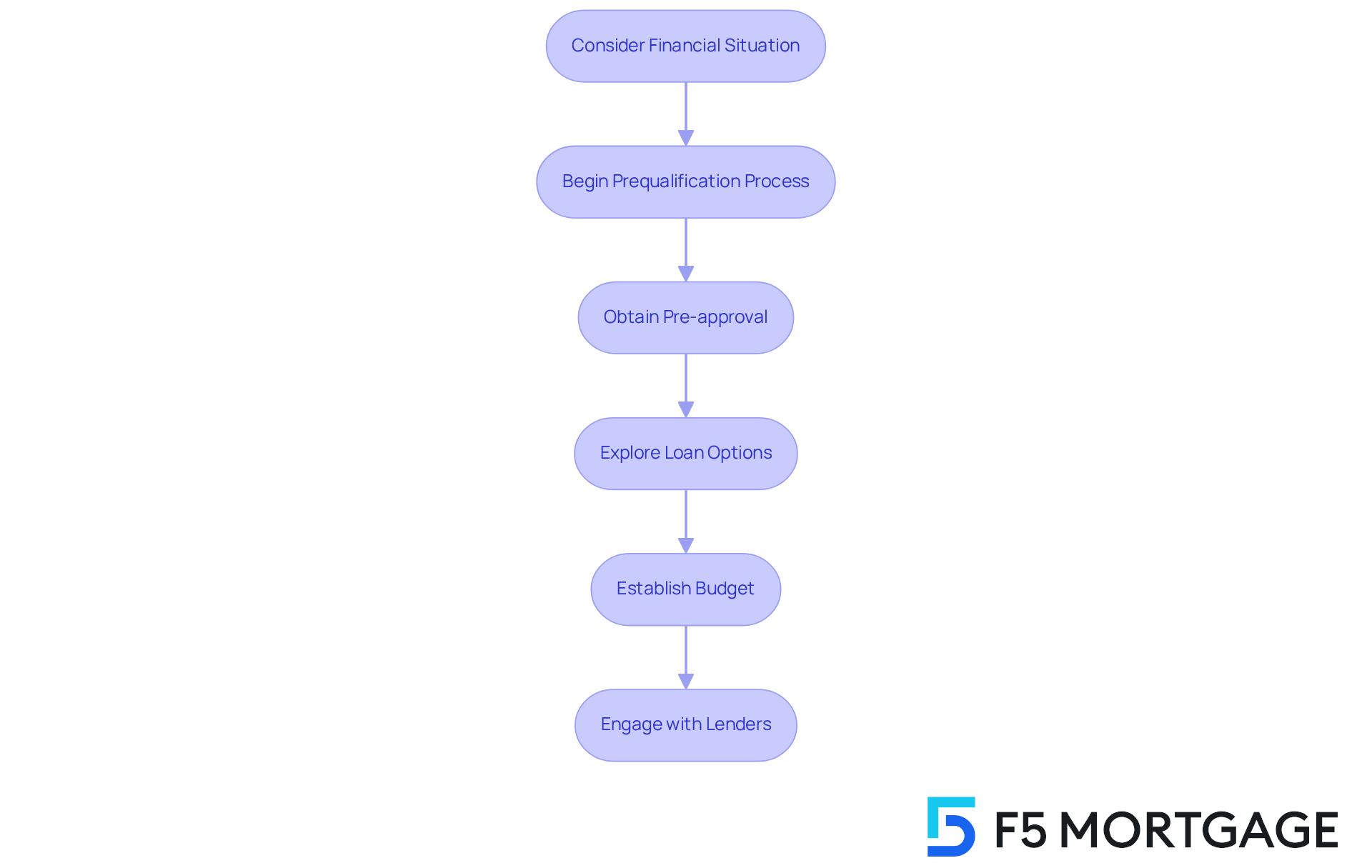Overview
We understand how important your credit score is, and it’s reassuring to know that prequalification does not affect it. This process involves a soft credit inquiry, which is not reported to credit bureaus and won’t influence your credit scores. For potential homebuyers, prequalification offers a wonderful opportunity to assess borrowing capacity without any risk.
However, it’s important to be aware that the subsequent preapproval process includes a hard inquiry. This can lead to a temporary decrease in your credit score. By knowing this, you can make informed decisions as you navigate the mortgage process.
Remember, we’re here to support you every step of the way. Understanding these steps can empower you to take control of your financial future.
Introduction
We know how daunting it can be to navigate the mortgage process, especially when it comes to understanding how prequalification impacts your credit score. Prequalification is an essential first step for potential homebuyers, providing valuable insights into your borrowing capacity without the risks tied to hard credit inquiries. Yet, many still wonder: how does prequalification truly influence your credit score? In this article, we’ll explore the mechanics of prequalification, clarify its benefits, and address common misconceptions, all while examining its role in the broader context of home financing. We’re here to support you every step of the way.
Define Prequalification: Understanding the Basics
Prequalification is a vital first step in the mortgage process, allowing lenders to assess your potential eligibility based on your self-reported financial information. This preliminary evaluation typically involves a soft credit inquiry, leading to the question of whether does prequalification affect credit score, but it won’t. During this initial assessment, lenders look at key factors such as your income, debt levels, and credit history to provide an estimate of how much you could potentially borrow. This process serves as a valuable resource for potential homebuyers, helping you understand your economic status before officially applying for a mortgage.
Real-world examples highlight the benefits of prequalification. For instance, many novice homebuyers find that getting approved in advance helps them set a clear budget, allowing them to focus their property search on homes that fit within their means. Additionally, having a letter of qualification can enhance your credibility with sellers, showcasing your serious intent and financial preparedness.
Experts emphasize the importance of this prior assessment in your homebuying journey. It not only aids in understanding your borrowing capacity but also prepares you for the more detailed preapproval process that follows. Recent data shows that a significant percentage of lenders offer prequalification services, making it accessible for many potential borrowers. This step is crucial for anyone looking to navigate the complexities of the mortgage landscape with confidence. Remember, we know how challenging this can be, and we’re here to support you every step of the way.

Examine the Impact of Prequalification on Credit Scores
We know how challenging navigating the mortgage process can be, especially when it comes to understanding credit scores. A common question is, does prequalification affect credit score, and the answer is that it typically does not, as it involves a soft check rather than a hard check. Gentle checks are not reported to credit bureaus and do not influence credit scores. This means you can explore mortgage options while considering how does prequalification affect credit score, without the worry of harming your credit. Prequalification serves as a low-risk strategy for assessing your mortgage eligibility.
In contrast, the preapproval process entails a more thorough review of financial documents, resulting in a hard assessment that can lead to a temporary dip in credit scores. Studies show that while hard assessments can decrease credit scores by several points, this impact is generally temporary. To mitigate the effect of hard checks, consider submitting multiple preapproval applications within a 30-day period, as these are treated as one check for scoring purposes. This approach allows you to compare loan terms from various lenders while minimizing potential dips in your credit score.
Overall, the initial assessment functions as a valuable first step for potential homebuyers. It offers insights into your borrowing capacity without the associated risks of hard inquiries. However, it’s important to remember that while prequalification does not carry as much weight as preapproval when negotiating with home sellers, it raises the question of how does prequalification affect credit score. Understanding how prequalification and preapproval influence your negotiation strategies is crucial. As a buyer, you can request repairs or upgrades as contingencies, which can significantly impact the final purchase agreement. We’re here to support you every step of the way in this journey.

Differentiate Between Prequalification and Preapproval
Understanding your borrowing capacity through prequalification raises the question of how does prequalification affect credit score based on the economic details you provide. It’s a helpful starting point for homebuyers embarking on this journey. However, it is important to consider how does prequalification affect credit score, as it takes this a step further. It involves a comprehensive assessment of your financial situation, including a hard credit inquiry, and verification of your income, assets, and debts. This thorough process leads to a conditional commitment for a specific loan amount, which gives you a clearer picture of your purchasing power and prompts the question: does prequalification affect credit score?
In competitive housing markets, the significance of preapproval cannot be overstated. Sellers often prefer buyers who are preapproved, as it demonstrates serious intent and financial readiness. In fact, statistics show that 94% of mortgage purchasers reported obtaining preapproval for financing. This highlights its critical role in the homebuying process. A preapproval letter carries more weight than a preliminary assessment document, which can strengthen your negotiating position.
Experts agree that knowing how does prequalification affect credit score not only clarifies your budget but also places you in a better position when making offers. As one industry expert wisely noted, ‘Getting approved early in your home search can help you stay focused on homes within your budget, avoid unnecessary stress, and make a stronger impression when it’s time to submit an offer.’ This competitive edge is vital, especially in markets where multiple offers are common.
In summary, while the initial screening is a helpful first step, preapproval provides a more precise and persuasive argument for buyers. It significantly enhances your chances of securing your dream home. We know how challenging this process can be, and we’re here to support you every step of the way.

Identify When to Consider Prequalification
Prequalification serves as a vital resource for first-time homebuyers and those feeling uncertain about their financial situation. It allows individuals to assess their borrowing capacity without the pressure of a formal application, making it an ideal starting point in the homebuying journey. By obtaining pre-approval, buyers can explore various loan options and establish a practical budget before embarking on their home search. This proactive approach not only clarifies financial boundaries but also empowers buyers to engage with lenders with confidence.
We understand that navigating this process can be daunting. Experts recommend starting the prequalification process early, ideally during the quieter months of January and February, when lenders can provide more personalized attention. This timing helps buyers identify potential qualification issues well in advance, ensuring they are prepared to act when the market becomes more competitive. Statistics show that prequalified buyers are often viewed more favorably by sellers, enhancing their negotiating power and increasing their chances of securing their dream home.
For those purchasing their first home, obtaining pre-approval can significantly alleviate the stress associated with financing. It offers a clearer understanding of what they can afford, enabling them to make informed decisions and focus on homes that align with their budget. With a financial approval letter in hand, buyers can confidently present offers, knowing they have the necessary financial backing to support their purchase. Ultimately, prequalification not only assists in budgeting but also streamlines the loan exploration process, making it an invaluable step toward achieving homeownership.

Conclusion
Prequalification is a vital first step in your mortgage journey, helping you understand your borrowing capacity without affecting your credit score. By using a soft credit inquiry, prequalification allows you to explore your mortgage options with confidence, laying a strong foundation for your home search.
We know how challenging this process can be, and that’s why it’s important to distinguish between prequalification and preapproval. Prequalification is a low-risk way to assess your eligibility, while preapproval involves a hard inquiry that may temporarily impact your credit rating. Understanding these differences can help you make informed decisions.
Obtaining prequalification early in the homebuying process comes with significant benefits. It gives you enhanced negotiating power and a clearer grasp of your financial boundaries, making you feel more secure as you navigate the housing market.
Ultimately, prequalification simplifies the mortgage process and empowers you to make informed choices. By grasping the nuances of prequalification and its effects on your credit score, you can approach the competitive housing market with confidence. Taking this proactive step not only increases your chances of finding your ideal home but also ensures you are financially prepared for the journey ahead. We’re here to support you every step of the way.
Frequently Asked Questions
What is prequalification in the mortgage process?
Prequalification is a preliminary evaluation that allows lenders to assess your potential eligibility for a mortgage based on self-reported financial information, including income, debt levels, and credit history.
Does prequalification affect my credit score?
No, prequalification typically involves a soft credit inquiry, which does not affect your credit score.
How does prequalification benefit homebuyers?
Prequalification helps homebuyers understand their borrowing capacity, set a clear budget, and focus their property search on homes within their financial means. It also enhances credibility with sellers by demonstrating serious intent and financial preparedness.
What factors do lenders consider during prequalification?
Lenders look at key factors such as your income, debt levels, and credit history to provide an estimate of how much you could potentially borrow.
Why is prequalification important before applying for a mortgage?
Prequalification aids in understanding your borrowing capacity and prepares you for the more detailed preapproval process that follows, making it crucial for navigating the mortgage landscape confidently.
Are prequalification services widely available?
Yes, a significant percentage of lenders offer prequalification services, making it accessible for many potential borrowers.








